As the Cloud Wars heat up, the Chinese Alibaba Group has overtaken DigitalOcean to become the second largest hosting company in the world. Netcraft's July 2017 survey found nearly 432,000 web-facing computers hosted by Alibaba.
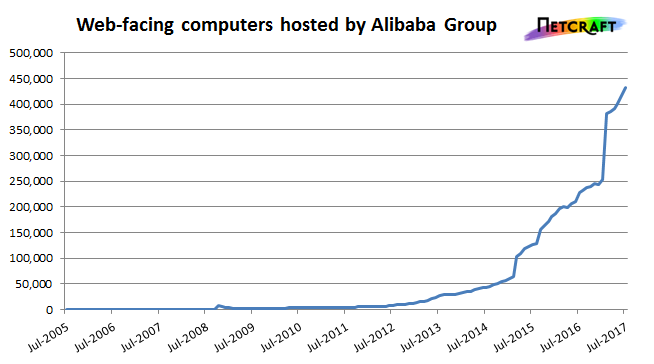
Open Sesame: Alibaba has shown tremendous growth in 2017.
Alibaba has clearly made significant progress in the web hosting battleground over the last five years. Its Aliyun cloud hosting service accounted for the majority of its web-facing computers in 2013, and made it the largest hosting company in China by 2015.
Since then, Aliyun's international website has been rebranded as Alibaba Cloud, and now offers even more features than before – seemingly in an attempt to take on the might of Amazon, which still reigns as the world's largest hosting company.
Cloud Wars: Episode II?
All three of the world's largest hosting companies – Amazon, Alibaba Group, and DigitalOcean – have achieved their positions by offering relatively low-cost cloud computing resources. While there is unavoidable overlap between the features offered by each company, a comparison of Amazon's pricelist and a list Alibaba Cloud's new offerings reveals some striking similarities.
For instance, Alibaba's general purpose virtual servers are known as Elastic Compute Service (ECS) instances, while Amazon Web Services offers similarly capable Elastic Compute Cloud (EC2) instances. Alibaba and Amazon also both offer private inter-instance networking, load balancing, auto scaling, cloud content delivery, and elastic IP addresses. Alibaba's ApsaraDB for RDS service provides features similar to Amazon's own Relational Database Service (Amazon RDS), and its Object Storage Service (OSS) is akin to Amazon's Simple Storage Service (S3).
This trend – where Alibaba Cloud appears to be implementing very similar features to those provided by Amazon Web Services – ought to be of great concern to Amazon. In a cloud hosting market with few distinguishing features amongst the leading providers, success could ultimately boil down to which one is cheapest.
Alibaba Cloud ready to grow its international customer base
Accessibility and ease of use can also play an important part in the success of a hosting provider, and Aliyun had some fundamental limitations that held back its earlier growth. Most notably, its virtual machines could only be hosted in China, which meant that they could not be bought by many customers outside China, and it was unsuitable for hosting websites that had an international audience.
Any customer who wanted to buy a virtual server at Aliyun had to go through an identity verification process that required them to be a national of China or one of a few other Asia-Pacific countries, or to represent a Chinese company. Also, all websites hosted in China were – and still are – required by law to obtain an ICP licence.
Flaky cross-border internet connectivity, along with potential interference by the Great Firewall of China, also made China a poor location to host any website that has an international audience. The aliyun.com website itself was also hosted in China, resulting in a very poor user experience from outside China – many international requests were unreasonably slow, and some did not succeed at all:
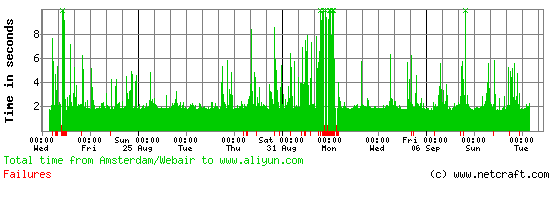
In September 2013, requests to aliyun.com from outside of China were often slow and occasionally timed out.
Alibaba Cloud has resolved these connectivity issues by opening overseas data centres and hosting the international version of its website – alibabacloud.com in Singapore. Singapore has numerous submarine cables that provide links throughout Asia, Australia, the Middle East, Europe and the US. This connectivity results in faster, more consistent international response times, with very few requests failing.
Alibaba Cloud's new data centers
In addition to its six data centers in mainland China, Alibaba Cloud now operates several others located in Hong Kong, Japan, Singapore, Australia, Dubai, Germany and the United States. It is also planning to open more in India and Indonesia by March 2018.

Currently available regions for Alibaba Cloud ECS instances.
These additional hosting locations effectively eliminate the regulatory issues that were associated with hosting websites in China, and also resolve performance issues. Not only is the connectivity to these countries significantly more reliable, but a customer also has the opportunity to get faster connection times by choosing a data center that is closer to its primary audience.
To facilitate growth in the world market, https://www.alibabacloud.com/ automatically presents international visitors with an English-language version of the site. Logged-in users can control their products via an international version of Alibaba Cloud's control panel at https://home-intl.console.aliyun.com, and a ticket-based support system is also available in English. Previously, the Aliyun website, control panel and technical support were only available in Chinese.
Conversely, Amazon's support for Chinese customers has also improved, and after broadening its operating relationship with the Beijing Sinnet Technology Co., it has been able to comply with Chinese telecom regulations and simplify its billing and fapiao invoice processes.
Alibaba Cloud's new international site features interactive background animations, headline offers, and detailed information about each Alibaba Cloud product. However, there are still problems to be ironed out, which become evident before a user has even managed to create an account. For example, signing up for a free Alibaba Cloud account via the international site requires the prospective customer to verify his email address by entering a number that is sent to the address; however, no such emails were received by Netcraft following several signup attempts during July.
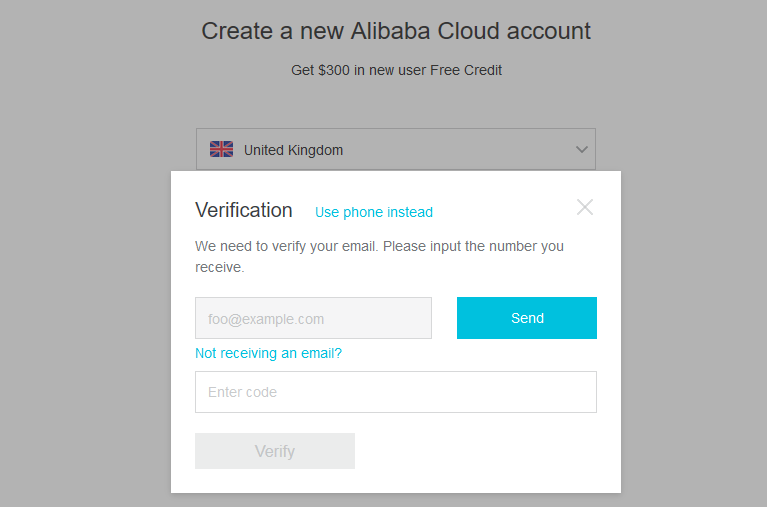
Clicking the "Not receiving an email?" link takes the user to a help page that advises, "If you still fail to receive an email, please contact us via support@alicloud.com." This merely routes the prospective customer down another frustrating dead-end: The server at alicloud.com does not accept SMTP connections, and Alibaba has failed to configure an MX record for the alicloud.com domain, and so any emails to this address will never be delivered.

Despite repeated attempts, it was not possible to summon help via the publicised support address.
Problems like these could immediately deter – or simply prevent – customers from signing up in the first place, although they may just be teething problems caused by Aliyun's international rebranding to Alibaba Cloud. This transition was still in progress while this article was being written, with some pages on https://intl.aliyun.com/ later redirecting to equivalent pages on https://www.alibabacloud.com.
Alibaba Cloud's enormous potential
Netcraft's July 2017 survey found that 93% of Alibaba's web-facing computers use IP addresses that are allocated to China, followed by 6% in the United States.
Considering how massive Alibaba Cloud is in China alone, it has enormous potential if it can attract similar levels of custom from the rest of the world. It is also a testament to how big a player China is on the internet – not only does it have more than twice as many internet users as the United States, but a company with most of its servers in China is now ranked #2 in the world.
Connectivity-wise, there seems to be no reason why Alibaba Cloud should not do well outside of China. For example, here is a performance chart of one of its smallest ECS instances hosted in Germany, collocated in a data center owned by Vodafone:
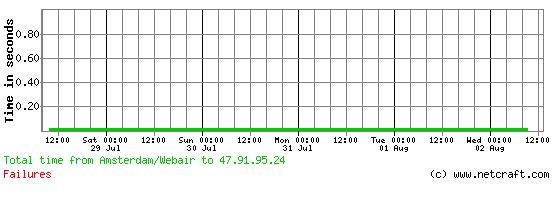
Should Amazon be afraid?
Amazon currently hosts more than 836,000 web-facing computers, which is nearly twice as many as Alibaba Group; although Amazon has had a considerable head start over both DigitalOcean and Alibaba, which are both relative newcomers.
Amazon has been the largest hosting company since September 2012, before the first DigitalOcean droplet had even appeared in Netcraft's survey. While this goes to demonstrate the impressive speed of DigitalOcean's growth over the past four years, Amazon is now growing at an even faster pace:
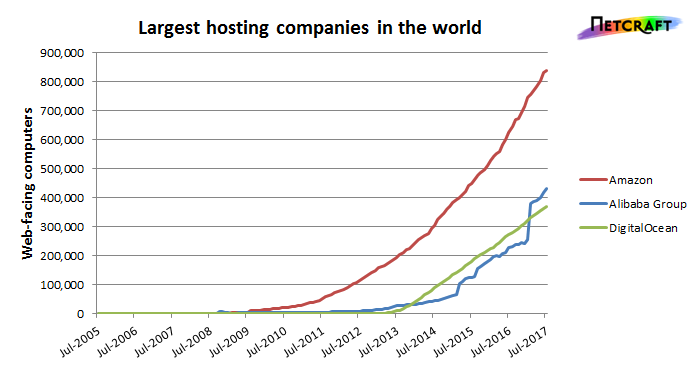
Although Alibaba is far from threatening Amazon's lead, its operations outside of China are arguably still in their infancy. In fact, the 402,000 web-facing computers it hosts from China-allocated IP addresses would alone be sufficient to make Alibaba the second largest hosting company in the world today.
By starting off in China, Alibaba has made significant progress and gained considerable experience in a market it understands well. Alibaba Cloud has used this experience to develop and refine its products, and time will tell if it is able to enjoy similar success across the global market.
Both Amazon and Alibaba have the financial might to drive future growth and develop (or copy) new cloud hosting innovations. Unlike DigitalOcean – which is purely a cloud hosting company – Amazon and Alibaba both attract billions of dollars of revenue from their online retail operations. These provide easily accessible surety for their hosting subdivisions, while DigitalOcean has been funded by lines of credit and investment capital.
Alibaba Cloud is finally price competitive
Another factor that held back Aliyun in the past was its relatively high pricing compared with its competitors. In 2013, its cheapest cloud instance was almost twice the cost of Amazon's cheapest, and the subsequent rise of DigitalOcean made Aliyun even less competitive. By 2015, DigitalOcean's $5/month droplets worked out less than a third of the cost of an equivalent instance at Aliyun.
But Alibaba Cloud has worked towards addressing these pricing discrepancies. Today, it is much more price competitive, with many services being cheaper than Amazon AWS. While it is difficult to make a direct comparison between competing specifications, Alibaba Cloud's regular pricing is also much closer to DigitalOcean's for some instance types – and some of its current promotional offers make it significantly cheaper.
In a move to capture new customers, one of Alibaba Cloud's headline promotional offers is an SSD cloud server for only $30 per year, which is 84% less than its regular pricing. These single-core instances come with 1GB memory, a 40GB SSD Cloud Disk, and 1TB/month data transfer, which gives them a higher spec than DigitalOcean's cheapest $60/year instances, while having the same amount of SSD storage as DigitalOcean's $240/year instances.
Alibaba Cloud accepts PayPal
Amazon AWS and Alibaba Cloud both accept credit cards as payment methods, but Alibaba also accepts PayPal, which is likely to work in its favour. Some people perceive PayPal payments to be less risky and more convenient, but Alibaba's history with PayPal raises the question of whether it will always remain a payment option at Alibaba Cloud.
For instance, Alibaba's international AliExpress online marketplace used to accept PayPal, but it no longer does. AliExpress customers are instead given a multitude of other payment options, which includes credit cards, bank transfers, Webmoney, Yandex.Money, and Western Union. Similarly, Amazon does not allow PayPal as a payment method – either for AWS or on its main online retail site – perhaps because it operates its own competing service in the form of Amazon Pay.
Notably, Alibaba also operates its own third-party online payment platform called Alipay, which is also a payment option on AliExpress, but not on Alibaba Cloud. It would be surprising if this payment method were not also made available on Alibaba Cloud in the future, as payments funded by a sufficient Alipay wallet balance would presumably be free to handle, or certainly cheaper to handle than a credit card payment. Alipay is still the primary payment method for Chinese cloud customers on cn.aliyun.com.
Alibaba's prior experience with several other payment methods on AliExpress also suggests that it could easily introduce additional payment methods for Alibaba Cloud in the future.
Who is using Alibaba Cloud?
Chinese companies are still the most prominent users of Alibaba Cloud, which is no surprise given that most of its web-facing computers are still hosted in China.
Although Alibaba has the second largest number of web-facing computers, it has a relatively low presence among the world's top million websites – only 6,560 are hosted by Alibaba, compared with 13,000 at DigitalOcean and 79,800 at Amazon. Alibaba's lower turnout is not too surprising, as many of the sites hosted in China are likely only intended for Chinese audiences, and therefore end up with a lower global rank.
Some of the highest ranked websites hosted in Alibaba's US data centers – and therefore more readily accessible by an international audience – belong to Alibaba Group companies. This includes several hostnames used by its AliExpress online retail service, which allows Chinese retailers to sell to international customers. Customers in mainland China are not allowed to buy from AliExpress; instead, they would use Alibaba's Taobao marketplace, which is hosted in China.

AliExpress is hosted in the US, so it can better target customers outside of China.
Other high-ranking sites hosted outside of mainland China include those operated by the academic publisher IVY, which specialises in the publication of international Chinese journals. China's biggest video site, Youku – which was acquired by Alibaba Group in 2016 – also has a reliable international presence by virtue of using the Alibaba Cloud CDN, which has 530 edge nodes around the world.
As with Amazon AWS, the cloud computing instances provided by Alibaba Cloud give customers plenty of control over not just what software is installed on them, but also which operating systems they use. This consequently results in a diverse ecosystem of operating systems within its cloud. Windows Server has always been big in China, and indeed, this is reflected by 37% of web-facing computers at Alibaba running Windows.
Alibaba Cloud also provides several Linux operating systems for its ECS instances, including various versions of Ubuntu, Debian, CoreOS, CentOS, FreeBSD, OpenSUSE, SUSE Linux, and its own Alibaba Cloud Linux; however, CentOS is the recommended distribution.
These Linux operating systems make up 58% of the web-facing Alibaba Cloud, and cost less than Windows instances, which incur a premium of roughly $5 per core per month to cover the cost of Windows licensing. For example, a 4-core Generation II ecs.n1.large instance costs $107.20/month when running Linux, or $127.94/month when running Windows Server 2016 Data Center Edition 64-bit English Edition.
Surprisingly, one of the Windows versions that was still available for new instances earlier this month was the end-of-life Windows Server 2003 R2, although customers had to explicitly acknowledge that they had understood the risks of running an operating system that is no longer supported by Microsoft, and agree to Alibaba's Agreement on Application for Continuing Using Windows Server 2003 Image Service. This agreement was only available in Chinese, again demonstrating that Alibaba Cloud has not yet fully transitioned to a global market.
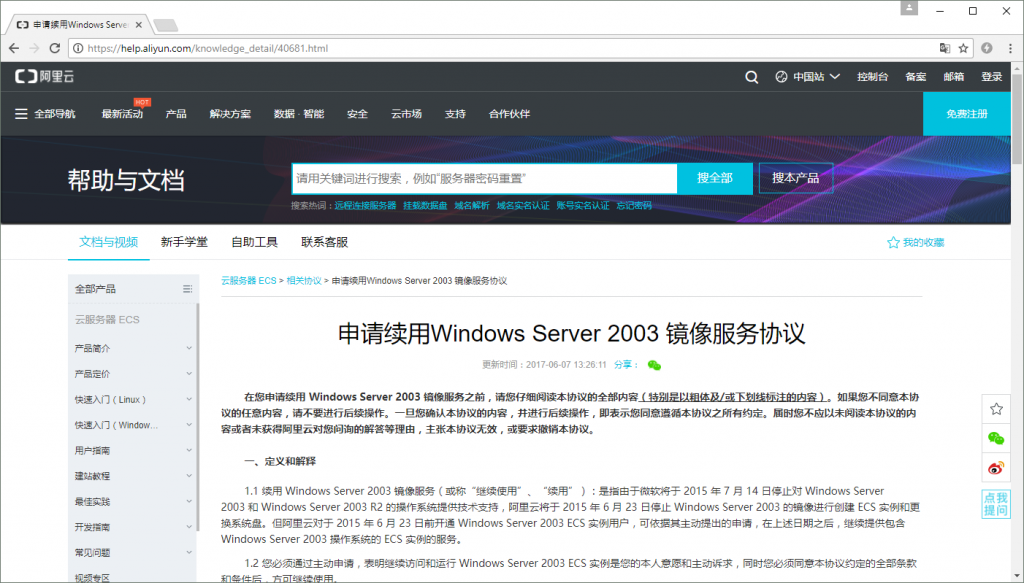
Some important parts of the Alibaba Cloud web interface have not yet been translated to English.
Despite the risks of running unsupported operating systems, around 6% of the web-facing computers hosted by Alibaba are using Windows Server 2003. This proportion will soon decrease, as Alibaba made its Windows Server 2003 images unavailable to new ECS instances from 20 July 2017.
Cloudy Conclusions?
Alibaba Cloud has implemented many products and services that are similar to those provided by Amazon AWS, and it is now making a concerted effort to expand its cloud hosting operations outside of China by providing data centers in several other countries.
Despite an impressive feature set, Alibaba Cloud's growth outside China is not yet as impressive as it has been in China. Possible reasons for this include better promotional offers for new users at Amazon AWS, cheaper regular pricing (and simpler cloud instances) at DigitalOcean, and a website that is not completely ready for an international audience. Furthermore, developers who have already invested time and effort into launching services on AWS or DigitalOcean are unlikely to jump ship to a new and unfamiliar platform unless there are significant advantages.
Some prospective customers may simply be put off by the fact that Alibaba Group is a Chinese company. The Chinese government is notorious for censoring what its citizens can see on the internet, and so there may be fear and uncertainty over whether such control could also extend to customer content hosted by Alibaba in other countries.
Perhaps with more aggressive promotional offers, or successful case studies of non-Chinese companies using Alibaba Cloud, it may be able to accelerate its worldwide growth. The infrastructure is already in place, so it could ultimately be marketing that makes Alibaba Cloud a serious contender in the Cloud Wars. It has already overtaken DigitalOcean in terms of web-facing computers, and stands every chance of catching up with Amazon if it plays its cards right.
Netcraft's web survey techniques provide an independent view with a consistent methodology on the number of web-facing computers at each hosting location worldwide. For more information, see our Hosting Provider Server Count.
Continue reading...

Open Sesame: Alibaba has shown tremendous growth in 2017.
Alibaba has clearly made significant progress in the web hosting battleground over the last five years. Its Aliyun cloud hosting service accounted for the majority of its web-facing computers in 2013, and made it the largest hosting company in China by 2015.
Since then, Aliyun's international website has been rebranded as Alibaba Cloud, and now offers even more features than before – seemingly in an attempt to take on the might of Amazon, which still reigns as the world's largest hosting company.
Cloud Wars: Episode II?
All three of the world's largest hosting companies – Amazon, Alibaba Group, and DigitalOcean – have achieved their positions by offering relatively low-cost cloud computing resources. While there is unavoidable overlap between the features offered by each company, a comparison of Amazon's pricelist and a list Alibaba Cloud's new offerings reveals some striking similarities.
For instance, Alibaba's general purpose virtual servers are known as Elastic Compute Service (ECS) instances, while Amazon Web Services offers similarly capable Elastic Compute Cloud (EC2) instances. Alibaba and Amazon also both offer private inter-instance networking, load balancing, auto scaling, cloud content delivery, and elastic IP addresses. Alibaba's ApsaraDB for RDS service provides features similar to Amazon's own Relational Database Service (Amazon RDS), and its Object Storage Service (OSS) is akin to Amazon's Simple Storage Service (S3).
This trend – where Alibaba Cloud appears to be implementing very similar features to those provided by Amazon Web Services – ought to be of great concern to Amazon. In a cloud hosting market with few distinguishing features amongst the leading providers, success could ultimately boil down to which one is cheapest.
Alibaba Cloud ready to grow its international customer base
Accessibility and ease of use can also play an important part in the success of a hosting provider, and Aliyun had some fundamental limitations that held back its earlier growth. Most notably, its virtual machines could only be hosted in China, which meant that they could not be bought by many customers outside China, and it was unsuitable for hosting websites that had an international audience.
Any customer who wanted to buy a virtual server at Aliyun had to go through an identity verification process that required them to be a national of China or one of a few other Asia-Pacific countries, or to represent a Chinese company. Also, all websites hosted in China were – and still are – required by law to obtain an ICP licence.
Flaky cross-border internet connectivity, along with potential interference by the Great Firewall of China, also made China a poor location to host any website that has an international audience. The aliyun.com website itself was also hosted in China, resulting in a very poor user experience from outside China – many international requests were unreasonably slow, and some did not succeed at all:

In September 2013, requests to aliyun.com from outside of China were often slow and occasionally timed out.
Alibaba Cloud has resolved these connectivity issues by opening overseas data centres and hosting the international version of its website – alibabacloud.com in Singapore. Singapore has numerous submarine cables that provide links throughout Asia, Australia, the Middle East, Europe and the US. This connectivity results in faster, more consistent international response times, with very few requests failing.
Alibaba Cloud's new data centers
In addition to its six data centers in mainland China, Alibaba Cloud now operates several others located in Hong Kong, Japan, Singapore, Australia, Dubai, Germany and the United States. It is also planning to open more in India and Indonesia by March 2018.

Currently available regions for Alibaba Cloud ECS instances.
These additional hosting locations effectively eliminate the regulatory issues that were associated with hosting websites in China, and also resolve performance issues. Not only is the connectivity to these countries significantly more reliable, but a customer also has the opportunity to get faster connection times by choosing a data center that is closer to its primary audience.
To facilitate growth in the world market, https://www.alibabacloud.com/ automatically presents international visitors with an English-language version of the site. Logged-in users can control their products via an international version of Alibaba Cloud's control panel at https://home-intl.console.aliyun.com, and a ticket-based support system is also available in English. Previously, the Aliyun website, control panel and technical support were only available in Chinese.
Conversely, Amazon's support for Chinese customers has also improved, and after broadening its operating relationship with the Beijing Sinnet Technology Co., it has been able to comply with Chinese telecom regulations and simplify its billing and fapiao invoice processes.
Alibaba Cloud's new international site features interactive background animations, headline offers, and detailed information about each Alibaba Cloud product. However, there are still problems to be ironed out, which become evident before a user has even managed to create an account. For example, signing up for a free Alibaba Cloud account via the international site requires the prospective customer to verify his email address by entering a number that is sent to the address; however, no such emails were received by Netcraft following several signup attempts during July.

Clicking the "Not receiving an email?" link takes the user to a help page that advises, "If you still fail to receive an email, please contact us via support@alicloud.com." This merely routes the prospective customer down another frustrating dead-end: The server at alicloud.com does not accept SMTP connections, and Alibaba has failed to configure an MX record for the alicloud.com domain, and so any emails to this address will never be delivered.

Despite repeated attempts, it was not possible to summon help via the publicised support address.
Problems like these could immediately deter – or simply prevent – customers from signing up in the first place, although they may just be teething problems caused by Aliyun's international rebranding to Alibaba Cloud. This transition was still in progress while this article was being written, with some pages on https://intl.aliyun.com/ later redirecting to equivalent pages on https://www.alibabacloud.com.
Alibaba Cloud's enormous potential
Netcraft's July 2017 survey found that 93% of Alibaba's web-facing computers use IP addresses that are allocated to China, followed by 6% in the United States.
Considering how massive Alibaba Cloud is in China alone, it has enormous potential if it can attract similar levels of custom from the rest of the world. It is also a testament to how big a player China is on the internet – not only does it have more than twice as many internet users as the United States, but a company with most of its servers in China is now ranked #2 in the world.
Connectivity-wise, there seems to be no reason why Alibaba Cloud should not do well outside of China. For example, here is a performance chart of one of its smallest ECS instances hosted in Germany, collocated in a data center owned by Vodafone:

Should Amazon be afraid?
Amazon currently hosts more than 836,000 web-facing computers, which is nearly twice as many as Alibaba Group; although Amazon has had a considerable head start over both DigitalOcean and Alibaba, which are both relative newcomers.
Amazon has been the largest hosting company since September 2012, before the first DigitalOcean droplet had even appeared in Netcraft's survey. While this goes to demonstrate the impressive speed of DigitalOcean's growth over the past four years, Amazon is now growing at an even faster pace:

Although Alibaba is far from threatening Amazon's lead, its operations outside of China are arguably still in their infancy. In fact, the 402,000 web-facing computers it hosts from China-allocated IP addresses would alone be sufficient to make Alibaba the second largest hosting company in the world today.
By starting off in China, Alibaba has made significant progress and gained considerable experience in a market it understands well. Alibaba Cloud has used this experience to develop and refine its products, and time will tell if it is able to enjoy similar success across the global market.
Both Amazon and Alibaba have the financial might to drive future growth and develop (or copy) new cloud hosting innovations. Unlike DigitalOcean – which is purely a cloud hosting company – Amazon and Alibaba both attract billions of dollars of revenue from their online retail operations. These provide easily accessible surety for their hosting subdivisions, while DigitalOcean has been funded by lines of credit and investment capital.
Alibaba Cloud is finally price competitive
Another factor that held back Aliyun in the past was its relatively high pricing compared with its competitors. In 2013, its cheapest cloud instance was almost twice the cost of Amazon's cheapest, and the subsequent rise of DigitalOcean made Aliyun even less competitive. By 2015, DigitalOcean's $5/month droplets worked out less than a third of the cost of an equivalent instance at Aliyun.
But Alibaba Cloud has worked towards addressing these pricing discrepancies. Today, it is much more price competitive, with many services being cheaper than Amazon AWS. While it is difficult to make a direct comparison between competing specifications, Alibaba Cloud's regular pricing is also much closer to DigitalOcean's for some instance types – and some of its current promotional offers make it significantly cheaper.
In a move to capture new customers, one of Alibaba Cloud's headline promotional offers is an SSD cloud server for only $30 per year, which is 84% less than its regular pricing. These single-core instances come with 1GB memory, a 40GB SSD Cloud Disk, and 1TB/month data transfer, which gives them a higher spec than DigitalOcean's cheapest $60/year instances, while having the same amount of SSD storage as DigitalOcean's $240/year instances.
Alibaba Cloud accepts PayPal
Amazon AWS and Alibaba Cloud both accept credit cards as payment methods, but Alibaba also accepts PayPal, which is likely to work in its favour. Some people perceive PayPal payments to be less risky and more convenient, but Alibaba's history with PayPal raises the question of whether it will always remain a payment option at Alibaba Cloud.
For instance, Alibaba's international AliExpress online marketplace used to accept PayPal, but it no longer does. AliExpress customers are instead given a multitude of other payment options, which includes credit cards, bank transfers, Webmoney, Yandex.Money, and Western Union. Similarly, Amazon does not allow PayPal as a payment method – either for AWS or on its main online retail site – perhaps because it operates its own competing service in the form of Amazon Pay.
Notably, Alibaba also operates its own third-party online payment platform called Alipay, which is also a payment option on AliExpress, but not on Alibaba Cloud. It would be surprising if this payment method were not also made available on Alibaba Cloud in the future, as payments funded by a sufficient Alipay wallet balance would presumably be free to handle, or certainly cheaper to handle than a credit card payment. Alipay is still the primary payment method for Chinese cloud customers on cn.aliyun.com.
Alibaba's prior experience with several other payment methods on AliExpress also suggests that it could easily introduce additional payment methods for Alibaba Cloud in the future.
Who is using Alibaba Cloud?
Chinese companies are still the most prominent users of Alibaba Cloud, which is no surprise given that most of its web-facing computers are still hosted in China.
Although Alibaba has the second largest number of web-facing computers, it has a relatively low presence among the world's top million websites – only 6,560 are hosted by Alibaba, compared with 13,000 at DigitalOcean and 79,800 at Amazon. Alibaba's lower turnout is not too surprising, as many of the sites hosted in China are likely only intended for Chinese audiences, and therefore end up with a lower global rank.
Some of the highest ranked websites hosted in Alibaba's US data centers – and therefore more readily accessible by an international audience – belong to Alibaba Group companies. This includes several hostnames used by its AliExpress online retail service, which allows Chinese retailers to sell to international customers. Customers in mainland China are not allowed to buy from AliExpress; instead, they would use Alibaba's Taobao marketplace, which is hosted in China.

AliExpress is hosted in the US, so it can better target customers outside of China.
Other high-ranking sites hosted outside of mainland China include those operated by the academic publisher IVY, which specialises in the publication of international Chinese journals. China's biggest video site, Youku – which was acquired by Alibaba Group in 2016 – also has a reliable international presence by virtue of using the Alibaba Cloud CDN, which has 530 edge nodes around the world.
As with Amazon AWS, the cloud computing instances provided by Alibaba Cloud give customers plenty of control over not just what software is installed on them, but also which operating systems they use. This consequently results in a diverse ecosystem of operating systems within its cloud. Windows Server has always been big in China, and indeed, this is reflected by 37% of web-facing computers at Alibaba running Windows.
Alibaba Cloud also provides several Linux operating systems for its ECS instances, including various versions of Ubuntu, Debian, CoreOS, CentOS, FreeBSD, OpenSUSE, SUSE Linux, and its own Alibaba Cloud Linux; however, CentOS is the recommended distribution.
These Linux operating systems make up 58% of the web-facing Alibaba Cloud, and cost less than Windows instances, which incur a premium of roughly $5 per core per month to cover the cost of Windows licensing. For example, a 4-core Generation II ecs.n1.large instance costs $107.20/month when running Linux, or $127.94/month when running Windows Server 2016 Data Center Edition 64-bit English Edition.
Surprisingly, one of the Windows versions that was still available for new instances earlier this month was the end-of-life Windows Server 2003 R2, although customers had to explicitly acknowledge that they had understood the risks of running an operating system that is no longer supported by Microsoft, and agree to Alibaba's Agreement on Application for Continuing Using Windows Server 2003 Image Service. This agreement was only available in Chinese, again demonstrating that Alibaba Cloud has not yet fully transitioned to a global market.

Some important parts of the Alibaba Cloud web interface have not yet been translated to English.
Despite the risks of running unsupported operating systems, around 6% of the web-facing computers hosted by Alibaba are using Windows Server 2003. This proportion will soon decrease, as Alibaba made its Windows Server 2003 images unavailable to new ECS instances from 20 July 2017.
Cloudy Conclusions?
Alibaba Cloud has implemented many products and services that are similar to those provided by Amazon AWS, and it is now making a concerted effort to expand its cloud hosting operations outside of China by providing data centers in several other countries.
Despite an impressive feature set, Alibaba Cloud's growth outside China is not yet as impressive as it has been in China. Possible reasons for this include better promotional offers for new users at Amazon AWS, cheaper regular pricing (and simpler cloud instances) at DigitalOcean, and a website that is not completely ready for an international audience. Furthermore, developers who have already invested time and effort into launching services on AWS or DigitalOcean are unlikely to jump ship to a new and unfamiliar platform unless there are significant advantages.
Some prospective customers may simply be put off by the fact that Alibaba Group is a Chinese company. The Chinese government is notorious for censoring what its citizens can see on the internet, and so there may be fear and uncertainty over whether such control could also extend to customer content hosted by Alibaba in other countries.
Perhaps with more aggressive promotional offers, or successful case studies of non-Chinese companies using Alibaba Cloud, it may be able to accelerate its worldwide growth. The infrastructure is already in place, so it could ultimately be marketing that makes Alibaba Cloud a serious contender in the Cloud Wars. It has already overtaken DigitalOcean in terms of web-facing computers, and stands every chance of catching up with Amazon if it plays its cards right.
Netcraft's web survey techniques provide an independent view with a consistent methodology on the number of web-facing computers at each hosting location worldwide. For more information, see our Hosting Provider Server Count.
Continue reading...

